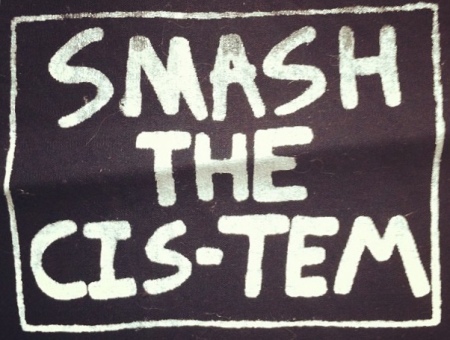
Gender identity is typically defined as the personal sense of one’s own gender. I argue that this conception of gender identity, once generalised as a social principle, leads to legal contradictions. In summary, if your gender identity rests on certain premises, and if you must contradict those premises to recognise the gender identity of another, then any law compelling you to do so would entail discrimination against your own gender identity, therefore contradiction.
Premise 1: Gender-identity of X consists in being a Woman only in virtue of having a female body (Cisgender).
Premise 2: Gender-identity of Y consists in being a Woman with a male body (Transgender).
Consequence 1: For X to recognise Y as a Woman entails invalidation of X’s own gender identity.
Consequence 2: For X to preserve X’s own gender identity entails invalidation of Y’s gender identity.
Informally, what it ‘feels like to be a woman’ for Y is logically inconsistent with what it ‘feels like to be a woman’ for X, which either invalidates the concept of womanhood (by violating the Law of Identity) or entails that one of the mutually inconsistent identities is false.
Legal protection of gender identity of one person may thus discriminate against gender identity of another; the exercise of the law violates itself, which is absurd. More generally, a person’s judgement about facts is not subject to a standard if that standard is subject to the person’s judgement, on account of circular reasoning. In order to be subject to a normative principle it must be possible for my judgement about myself to be wrong, otherwise it is not a common standard according to which the law could be consistently applied. Gender-identity does not satisfy this normative criterion. This offers an absolute defence to the charge of discrimination on the basis of gender identity, rendering the law unenforceable.
This problem can be approached from another angle. The law prohibits discrimination on the basis of gender identity Or sex; these categories are considered on par, equally protected, but this leads to practical contradictions. If a male who identifies as a woman is refused entry to female-only changerooms this qualifies as discrimination on the basis of gender identity (notwistanding the objection raised above, regarding conflicting gender identities), but if females are forced to strip before a male in their female-only changerooms this qualifies as discrimination on the basis of sex. This anomaly is even more apparent in sports, because inclusion of males in female competition categories essentially eliminates the right of females to have their own competition category. This disadvantages females on account of advantageous physiological characteristics of males in relation to certain sports. Most human rights organisations and even legislators seem to arbitrarily and perhaps unwittingly discriminate in favour of gender identity over sex.
On a side note, normalisation of gender-identity based on self-declaration may also be a serious health hazard. When healthcare providers are dealing with medical conditions, especially in cases of emergency where the patient is unable to provide any information, doctors need to be absolutely clear on the sex of the person undergoing treatment, not just their gender-identity. If a male presents himself to a hospital as a woman he may not receive a diagnosis or treatment appropriate for his body, due to confusion about identity. While this is a practical rather than legal or logical consideration, it would seem prudent to address this risk factor prior to legal endorsement of gender theory.
To clarify, I think it is right to protect transgender people from discrimination in the public domain on the basis of their transgederism. My objection is only to how the problem is currently formulated, due to the logical inconsistency associated with gender-identity by self-declaration. The law should distance itself from gender theory and stick to a simple, legally recognised and medically certified “transgender status” as a genuine health condition, and thus avoid controversy about the scope of gender identity. This would eliminate the free for all self-diagnosis and greatly mitigate its potential abuses.